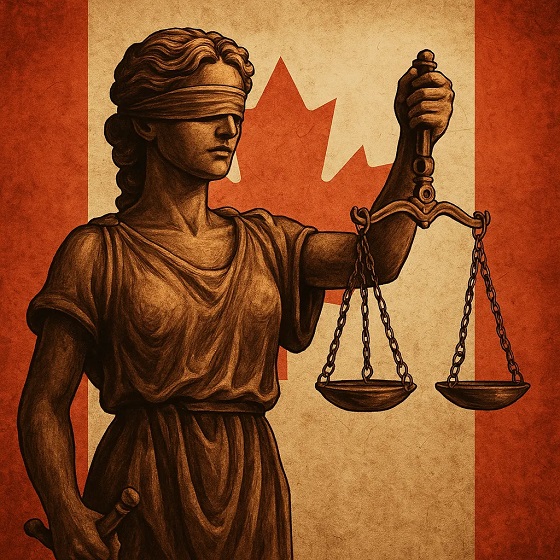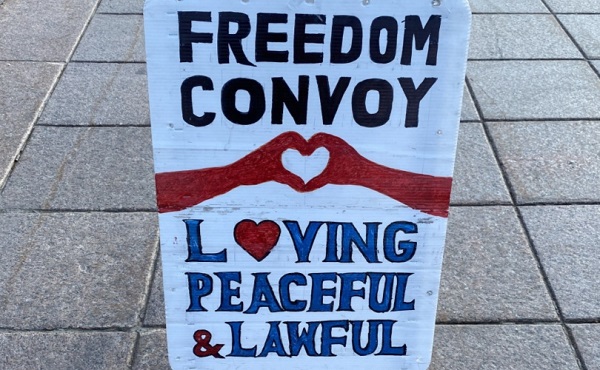Censorship Industrial Complex
Bill C-9 and the Tyranny of Feeling Heading Straight for Canadians

When governments turn offence into law, liberty collapses into sentiment. Canada risks importing Britain’s mistakes, just as J.D. Vance warned Europe in Munich.
On February 14th of this year (coincidentally, the anniversary of Justin Trudeau’s invocation of the Emergencies Act against protestors), in the grand hall of the Munich Security Conference, J.D. Vance startled Europe’s elites by saying what few of them expected to hear. The greatest threat to their democracy, he argued, was not Moscow. It was their own governments that turned on their citizens in the name of fighting misinformation and hate. Vance catalogued the evidence with blunt precision: British citizens arrested for jokes on Twitter, preachers detained for quoting scripture, elections tampered with under the smiling banner of progress. The room bristled with discomfort, yet the truth could not be mistaken. Western democracies are abandoning the free expression that once sustained them, and they are doing so under the new morality of emotion.
Canada now finds itself in that same trajectory with Bill C-9, Ottawa’s latest legislative foray into the culture war. It is being sold as the Combatting Hate Act, a law meant to protect vulnerable minorities and to defend sacred spaces from intimidation.
Peel back the packaging and its essence appears at once: the codification of subjective feelings into the Criminal Code. What the United Kingdom has lived through for the last decade, police investigating citizens for limericks and memes, Canada now risks importing as law.
The mechanics of the bill are deceptively technical. Until now, prosecutions for so-called hate propaganda required the Attorney General’s approval. That safeguard was in place to ensure that prosecutions were filtered through political accountability and not simply triggered by an activist’s complaint. Bill C-9 abolishes that filter, placing the discretion squarely with police officers who will be pressed to act on every allegation. Remember how the cops acted during COVID.
The bill then goes further by creating new offences for the “willful promotion of hatred” through words, symbols, or representations, a category so broad it could ensnare a placard at a school board protest or a verse from scripture. It also introduces a stand-alone “hate crime” category in which the motive itself becomes the crime. In short, it criminalizes thought. Finally, it expands criminal liability to anyone who obstructs or intimidates access to religious or cultural sites. In the last five years, the law in Canada has not been exceptionally diligent in prosecuting church arson and gunfire attacks on synagogues, despite existing laws. The C-9 wording is so loose that a prayer vigil outside an abortion clinic or a parents’ protest at a school could easily fall within its net.
Why does this matter? Because it moves the law away from objective acts of violence or harassment and into the murky realm of motive. It is one thing to punish a man for assault; it is quite another to punish him more severely because a cop or judge claims to know the intention behind his act. It is one thing to outlaw threats; it is quite another to treat blunt disagreement as hate. The result is predictable. Citizens will censor themselves on questions of immigration, gender ideology, or religious teaching because the cost of speaking plainly will be too high. The process itself, arrest, seizure of devices, and the humiliating headline will become the punishment.
The British experience shows us the road ahead. Harry Miller, a former policeman, was investigated in 2019 for retweeting a limerick that mocked gender identity theory. Police recorded a “non-crime hate incident” in his file and told him they needed to “check his thinking.” Paul Chambers, in 2010, made a sarcastic joke on Twitter about blowing up an airport after his flight was cancelled. He was arrested, fined, and lost his job, but was acquitted only years later, by which time the damage had already been done.
Haultain Research is a reader-supported publication.
To receive new posts and support our work, consider becoming a free or paid subscriber.
In 2020, Kate Scottow was detained and held for questioning because she “misgendered” someone online; her children were left alone as police seized her devices. British street preachers have been hauled away for reading biblical verses aloud. Even football fans have been arrested for chants and tweets. In a single year, British police recorded 120,000 “non-crime hate incidents” and arrested roughly 3,000 people for “grossly offensive” posts.
The phrase in Britain is “grossly offensive.” The phrase in Canada will be “wilfully promoting hatred.” Both are so elastic that they depend solely on the complainant’s feelings. In effect, the state outsources its standards to the most sensitive or malevolent among us, empowering activists to wield the criminal law as a bludgeon against their opponents.
Here, J.D. Vance’s speech in Munich is especially relevant. He noted that Western elites have become adept at justifying repression under the guise of safety. They claim to fight disinformation, but in practice, they suppress opposition. They claim to defend minorities, but in practice, they silence majorities. They claim to defend democracy, yet in Europe, they annul elections. In Canada, there is now a push to criminalize dissent.
What emerges is a selective enforcement regime in which elites are exempt and ordinary citizens are vulnerable. A tweet from a farmer in Red Deer will be treated as criminal, while a prime minister declaring that parents who question gender ideology are extremists goes unpunished.
Beneath all of this lies a deeper cultural drift. Bill C-9 is not merely bad law. It is bad philosophy. Modern governments have learned to glorify emotivism, to elevate feelings over objective reason because emotions win elections. The Canadian philosopher Charles Taylor clearly saw this trend in his Massey lectures, later published as The Malaise of Modernity. Allan Bloom did the same in his Closing of the American Mind.
Taylor warned that when cultures replace shared standards of truth with the subjectivity of self-expression, they hollow out the ground beneath their toes. Bill C-9 is the juridical form of that malaise, the victory of the subjective over the rational, the enthronement of offence as a legal standard. When reason is abandoned, politics slides into tyranny, for then only force remains to adjudicate among clashing feelings.
The antidote against those who want to curtail your speech is not silence but more speech. Resistance begins with refusing to be cowed. State the obvious, again and again: men are not women, women are not men, for example. The categories of nature are not dissolved by individual whim.
Hannah Arendt, who more than anyone decoded the mechanisms of totalitarianism in the twentieth century, insisted that the greatest threat to power was not always open rebellion but ridicule. Mock the absurdities of their ideology, not in cruelty but in charity. Expose them as unserious, as unscientific, as laughable. Power that relies on emotion and feeling cannot withstand laughter. The rule of sentiment is brittle, which is why it demands coercion to sustain itself.
John Stuart Mill remains the strongest guide here. In On Liberty, he reminded us that the suppression of any opinion, however offensive, robs society of the chance to test truth. If an opinion is wrong, it sharpens truth by contest; if it is right, then silencing it robs us of truth itself. Mill’s harm principle is stark in its relevance. The state may act only to prevent real harm, not to shield citizens from chafed feelings. Hurt feelings are the price of liberty, and liberty is the most valuable condition for reason to flourish. When governments claim the right to protect citizens from offence, they do not protect minorities; they infantilize everyone.
So who loses under Bill C-9? Faith communities, whose doctrine can be branded hateful. Parents who risk charges for questioning curricula. Feminists who fight to preserve sex-based protections. Protesters, from truckers to farmers to pro-life advocates. And ordinary Canadians online, whose memes and jokes can be turned into evidence of “hate propaganda.”
Bill C-9 is not a shield for the vulnerable. It is a sword for the boundlessly powerful. It is the law’s surrender to the tyranny of feeling, the enthronement of emotion as authority. Vance’s warning in Munich was not only for Europe. It was for Canadians too. If disagreement is hate, liberty itself is outlawed. Canada now faces a choice: do we defend and protect our freedom, or do we accept a government that punishes thought?
The antidote remains the same: resist, speak, mock, and laugh. Proclaim the truth plainly but respectfully. Refuse to bow to the cult of feeling. The rule of reason is fragile but essential. It must be preserved. Without it, Canada will follow Britain into the swamp of self-censorship and state-enforced sentiment. With it, liberty might yet endure.
I wrote this post based on a few notes that I made for this conversation in Leaders on the Frontier.
Please subscribe to Haultain Research.
For the full experience, and to help us bring you more quality research and commentary, please upgrade your subscription.
Business
UK Government Dismisses Public Outcry, Pushes Ahead with Controversial Digital ID Plan

Over 2.7 million signatures couldn’t move the needle on a dystopian plan already set in motion.
|
A UK government plan to introduce a nationwide digital identification system is moving ahead, despite a public backlash that saw more than 2.7 million people sign a petition urging its cancellation.
The proposal, first announced by Labour in September, would provide a digital ID to every UK citizen and legal resident aged 16 and above.
Prime Minister Keir Starmer claimed the new system would help strengthen border enforcement and reduce illegal employment, describing the ID, dubbed the “Brit Card,” as a tool to “make it tougher to work illegally in this country, making our borders more secure.”
The public response was overwhelmingly opposed. Warnings about centralized data collection, privacy intrusions, and increased state surveillance flooded public discourse.
Descriptions of the proposal ranged from a “dystopian nightmare” to fears of a gateway to “digital control.”
Not long after Labour’s announcement, a petition was created on the official UK Government and Petitions website.
|
 |
|
It quickly gathered enough signatures to qualify for parliamentary debate, a 100,000-signature benchmark, and within days surged past two million.
Despite reaching over 2.7 million signatures, the government issued a formal response rejecting the petition and restating its commitment to the scheme.
According to the response, published by the Department for Science, Innovation and Technology, the new ID system is part of Labour’s wider aim to modernize public services.
“We will introduce a digital ID within this Parliament to help tackle illegal migration, make accessing government services easier, and enable wider efficiencies. We will consult on details soon,” the government wrote.
Although a formal consultation process is expected in the coming weeks, involving employers, unions, and civil society organizations, the government made it clear that legislation to support the digital ID system is on the way.
Over time, it is expected to serve as a single access point for government services like benefits, tax records, and other official interactions, potentially eliminating the need for physical documents or multiple logins.
The government’s decision to push ahead with a national digital ID comes in the shadow of the recently enacted Online Safety Act, which has already laid the groundwork for sweeping identity checks across the internet.
That law, marketed as a way to protect children from harmful content, gave regulators broad authority to demand age verification for accessing a wide range of online services.
The result is an emerging digital framework where proving who you are, even just to browse or communicate, is becoming a condition of access.
|
Censorship Industrial Complex
Hurting someone’s feelings could be punishable under Canadian hate crime bill: legal expert

From LifeSiteNews
Justice Centre for Constitutional Freedoms president John Carpay said that Bill C-9 in effect seeks to make it the law to ‘punish the emotion of hate.’
One of Canada’s leading constitutional law experts blasted a new Liberal “hate crime” bill as something that would “empower police” and the government to go after those it deems have violated a person’s “feelings” in a “hateful” way.
In a recent commentary piece posted by The Epoch Times, Canadian legal expert and lawyer John Carpay, founder and president of the Justice Centre for Constitutional Freedoms (JCCF), observed that the Liberals’ Bill C-9, or Combating Hate Act, is dangerous.
“Canada’s Criminal Code should punish bad behaviour, not bad feelings. Canadians need protection from crime, not from offensive opinions that might be considered ‘hateful’ by some but not by others,” Carpay wrote.
Carpay said that it seems the Liberals are “fixated on further criminalizing feelings of hatred that criminals may have had when carrying out their crimes.”
“Defining hate is near-impossible, as can be seen whenever politicians and judges attempt to do so,” he wrote.
Bill C-9 was brought forth in the House of Commons on September 19 by Justice Minister Sean Fraser.
The Liberals have boasted that the bill will make it a crime for people to block the entrance to, or intimidate people from attending, a church or other place of worship, a school, or a community center. The bill would also make it a crime to promote so-called hate symbols and would, in effect, ban the display of certain symbols such as the Nazi flag.
Bill C-9 reads, regarding what is deemed “hateful,” that “For greater certainty, the communication of a statement does not incite or promote hatred … solely because it discredits, humiliates, hurts or offends.”
Carpay said Bill C-9 “allows Canadians to express ‘disdain’ and ‘dislike’ without worrying about facing criminal charges, yet Canadians must be careful not to possess illegal emotions that involve ‘detestation’ or ‘vilification.’ It’s not ‘hate’ to discredit, humiliate, hurt, offend, and dislike people; it is “hate” to detest and vilify people. Are we clear?”
Carpay said that Bill C-9 in effect seeks to make it the law to “punish the emotion of hate,” noting how the reality is this “ignores” the reality that Canada’s judges are already “empowered to impose more severe penalties on hate-fueled criminals.”
The new bill increases the maximum penalty a judge can give to people convicted of crimes.
“If the judge decides that the convicted person’s emotions crossed from the legal territory of ‘disdain’ and ‘dislike’ into the crime of feeling ‘detestation’ or ‘vilification,’” Carpay noted.
This means that for a minor crime, where the maximum penalty is two years, a new “hate” crime offense could land someone in jail for up to five years.
“For the man convicted of a crime with a maximum penalty of five years in jail, if the judge determines that he possessed ‘hate’ in his heart, the judge can lock him up for 10 years instead of five,” Carpay stated.
“For more serious crimes, where the maximum penalty is 14 or more years in jail, if the judge thinks the convicted person was ‘hateful,’ the sentence can be imprisonment for life.”
The Liberals’ Bill C-9 has been blasted by the Canadian Conservative Party as a “dangerous” piece of legislation.
Conservative MP Leslyn Lewis warned it will open the door for authorities to possibly prosecute Canadians’ speech deemed “hateful.”
Carpay: Bill would ‘empower’ police, government
As it stands, Section 319(6) of Canada’s Criminal Code mandates consent of the nation’s attorney general before a person can be charged with a hate crime. Lewis and Carpay warned that Bill C-9 will eliminate this protection.
“Bill C-9 makes existing laws worse by empowering police to use the Criminal Code to impose their own subjective beliefs about what a police officer personally feels is ‘hateful.’ The bill does this by repealing an important safeguard that protects the free speech of all Canadians, namely the requirement that the attorney general consent to any prosecution for hate speech offences,” Carpay said.
He observed that the attorney general consent “safeguard,” as is the case now, has allowed hate speech prosecutions to proceed, “but only after a review by a higher authority.”
Fraser himself said that “by removing this step, law enforcement would be able to act quickly.”
Carpay noted how the bills promise to make it a “crime” to intimidate a church or place of worship, which is “not true.”
“It is already a crime to utter threats, intentionally provoke a state of fear in people, engage in physical contact (even in a minor way), and physically obstruct people from going about their business,” he wrote.
“Bill C-9 creates a duplicative and superfluous criminal offence of impeding access to a house of worship by intentionally provoking a state of fear; this conduct is already criminal under existing laws. By creating a redundant new law, Bill C-9 appears to be an exercise in virtue-signaling.”
Carpay also lamented how the bill mentions “rising antisemitism” but says nothing about the arson attacks on Catholic and Christian churches plaguing Canada.
“Anti-Catholic hate is obviously not on the minister’s radar. If it was, he would have mentioned it when introducing the Combatting Hate Act,” Carpay wrote.
“It goes to show how Bill C-9 is primarily about politics and appearances, even while undermining free expression in Canada.”
Since taking power in 2015, the Liberal government has brought forth many new bills that, in effect, censor internet content as well as go after people’s ability to speak their minds.
-

 Business2 days ago
Business2 days agoBill C-8 would allow minister to secretly cut off phone, Internet service
-

 Automotive2 days ago
Automotive2 days agoAmerica’s Troubled EV Industry Loses Its Subsidized Advantage – Now What?
-

 Fraser Institute2 days ago
Fraser Institute2 days agoCarney government should scrap gun ‘buyback’ program and save taxpayer money
-

 Censorship Industrial Complex2 days ago
Censorship Industrial Complex2 days agoWhen Did Traditional Values Become Hate Speech?
-

 Crime2 days ago
Crime2 days agoDrug trafficker says Trump battle with the cartels is making an impact
-

 Business15 hours ago
Business15 hours agoLA skyscrapers for homeless could cost federal taxpayers over $1 billion
-

 Alberta16 hours ago
Alberta16 hours agoAlberta’s E3 Lithium delivers first battery-grade lithium carbonate
-

 Artificial Intelligence15 hours ago
Artificial Intelligence15 hours agoAI chatbots a child safety risk, parental groups report









